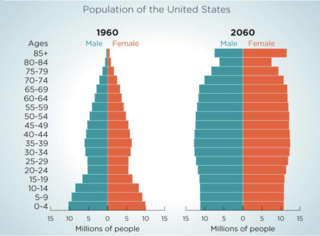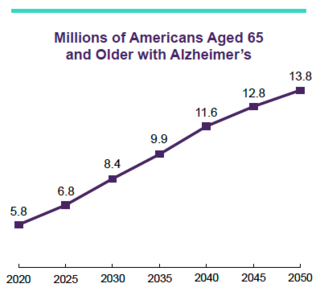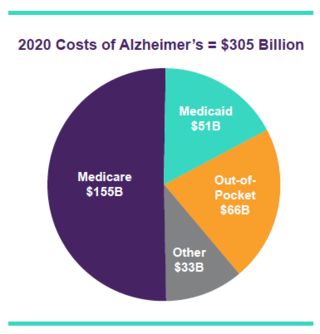Career
Why We Need Alzheimer’s Research and What to Do About It
We need to work to increase the funding for research on Alzheimer’s disease.
Posted October 22, 2020

The projected numbers of individuals in this country with Alzheimer’s disease and related disorders is alarming. We are facing a tsunami of dementia. Today, there are approximately 5.8 million Americans living with Alzheimer’s disease—1 in 10 people aged 65 and older. However, in part due to the increased numbers of older adults in our society (Figure 1), that number rises to 13.8 million by 2050 (Figure 2).

We desperately need to find disease-modifying treatments that can slow down and eventually cure this terrible disease. By “disease-modifying,” I mean treatments that can affect the underlying disease process—the plaques and tangles that build up in the brain and destroy brain cells in Alzheimer’s disease. These treatments have been the major research goal for the past 20 years, which is appropriate, as they will provide the first steps toward a cure.
Potential disease-modifying treatments that are currently under investigation in clinical trials include drugs that use monoclonal antibodies grown in a laboratory that are given intravenously (by vein) to the person monthly. Antibodies are normally what the body uses to fight infections, but these antibodies are designed to stick to either the beta-amyloid plaques or the tau neurofibrillary tangles. Once these antibodies are in place, the body’s immune system will see the antibody and remove the plaques or tangles.
But disease-modifying therapies are not enough. Because any treatment that we can envision today will only slow down the disease—not cure it—we are likely to see individuals living longer with Alzheimer’s disease. For this reason, we also desperately need pharmacologic and non-pharmacologic therapies that can help individuals with memory problems perform better in daily life, keeping them independent and out of nursing homes and other institutions.
And because we need to keep individuals living with Alzheimer’s disease and related dementias living at home longer, we need to support those who support them, that is, the caregivers. We need more research on how to help family members be more effective caregivers so that they do not burn out, and so that they can continue to manage their other responsibilities, whether that means their own families or the work they do outside the home.

Some would argue that we cannot afford to pursue Alzheimer’s research. I would say we cannot afford not to pursue Alzheimer’s research. Figure 3 shows that, right now, caring for individuals with Alzheimer’s disease costs society approximately $305 billion dollars—that billion, with a B. If there is a proportional increase in cost, that means that in 2050 caring for individuals with Alzheimer’s disease will cost more than $725 billion—and the Alzheimer’s Association is predicting $1.1 trillion. It will bankrupt the country.
Currently, the National Institutes of Health (NIH) is expected to spend approximately $2.8 billion dollars on Alzheimer’s disease in 2020. This is a large amount, but still less than 1% of the amount that we, as a society, are spending caring for individuals with this disease each year!
We need to work to increase the funding for research on Alzheimer’s disease. There are many promising grants submitted to NIH every year that are not funded—not because they are not good, but simply because there are not enough funds. Currently, fewer than one in four grants are funded, with the overall NIH funding rate being 18%.
The bottom line is that we need a president who will increase funding of NIH, not cut it. We need a president who understands the economic and human costs of terrible diseases like Alzheimer’s disease.
© Andrew E. Budson, MD, 2020, all rights reserved.


